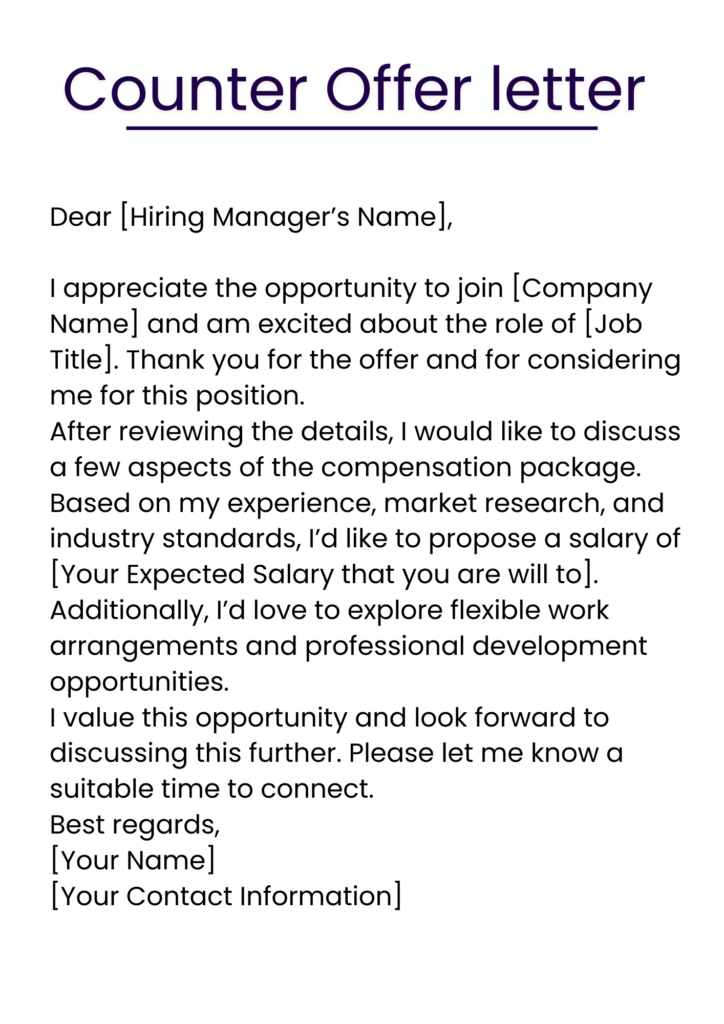A counter-offer is your opportunity to negotiate better compensation, benefits, or work arrangements without jeopardizing the opportunity. In this guide, we’ll walk you through the key aspects of crafting a compelling counter-offer letter, when to negotiate, and how to justify your request effectively.
What Is a Counter Offer?
A counter-offer is a professional response to an employer’s initial job offer, proposing revised terms such as salary, benefits, or working conditions. It signals your strong interest in the position while ensuring your compensation matches your value in the market.
Rather than an ultimatum, a counter-offer is a structured negotiation tool. Employers often expect some negotiation, so making a well-reasoned case can work in your favour.
When Should You Send a Counter Offer?
Not every job offer requires negotiation, but there are specific scenarios where a counter-offer makes sense:
- Salary is below market standards – Use salary insights from avua’s Salary Analysis Tool to compare industry averages.
- Your skills and experience justify higher compensation – If you bring niche expertise, certifications, or a strong track record, your worth may exceed the initial offer.
- You have competing job offers – Leverage multiple offers to negotiate better terms.
- Non-monetary benefits need improvement – Request bonus adjustments, stock options, remote work flexibility, or vacation days.
- Relocation or additional responsibilities – If the role requires relocation or significantly more duties than initially discussed, negotiating fair compensation is essential.
How to Structure a Counter-Offer Letter
A well-structured counter-offer letter should be professional, concise, and backed by facts. Here’s a breakdown of what to include:
1. Start with Gratitude
Begin by thanking the employer for the opportunity—express excitement about the role and appreciation for the offer.
Example:
Dear [Hiring Manager’s Name],
Thank you for extending the job offer for the [Job Title] position at [Company Name]. I am genuinely excited about the opportunity to contribute to your team and bring my skills to the organization.
2. State Your Counter Offer Clearly
Present the specific changes you’d like to negotiate. Be direct but professional.
Example:
After reviewing the offer and considering industry benchmarks, I’d like to discuss adjusting the proposed salary. Based on my experience in [mention relevant skills/field] and market research via avua’s Salary Insights, a compensation of [Your Expected Salary that you are willing to] aligns more closely with the industry standard for this role.
If negotiating benefits, structure your request similarly:
Additionally, I’d like to explore flexibility in remote work options and professional development opportunities to ensure long-term success in this role.
3. Provide Justification
Support your request with data and achievements. Demonstrate why you bring exceptional value.
- Market Research: Reference salary benchmarks from avua’s salary insights.
- Accomplishments: Highlight quantifiable successes (e.g., revenue growth, project completions, efficiency improvements).
- Skills & Certifications: Mention any specialized qualifications that set you apart.
4. End on a Collaborative Note
Close your letter by reiterating your interest in the role and willingness to discuss the offer further.
Example:
I appreciate your taking the time to consider this request. I’m confident we can find a solution that reflects my expertise and the value I’ll bring to [Company Name]. Please let me know a convenient time to discuss this further.
Counter Offer Email Template
Subject: Follow-up on Job Offer for [Job Title] at [Company Name]

How to Justify a Counter Offer Effectively
1. Use Salary Research Tools
Before proposing a number, back your request with data from avua’s Salary Insights. This tool helps compare compensation trends across industries and locations, strengthening your negotiation.
2. Leverage Your CV & Cover Letter
If your achievements and certifications justify a higher salary, ensure your CV and cover letter reflect that. avua’s ATS-optimized CV and Cover Letter Builder can help highlight key qualifications that make you stand out.
3. Emphasize Career Growth
If negotiating for better career opportunities, highlight how continuous learning and professional development will benefit you and the company. Employers appreciate candidates who are proactive about growth.
Common Mistakes to Avoid
- Being Too Aggressive – Keep the tone respectful and open-ended. Avoid ultimatums.
- Lack of Research – Unsupported salary demands weaken your case. Use avua’s insights for credible data.
- Ignoring Non-Salary Benefits – Salary isn’t everything; perks like flexible work, career development, and bonuses matter too.
- Delaying Response – Counter promptly (within 24-48 hours) to show enthusiasm and professionalism.
Make Your Counter Offer Count
Negotiating a job offer can feel daunting, but the right approach can lead to a more rewarding career move. A well-crafted counter-offer signals confidence, professionalism, and a strong understanding of your worth.
Using tools like avua Salary Insights, CV Builder, and Cover Letter Builder, candidates can effectively prepare for salary negotiations and secure the best possible offer.
Looking to maximize your career opportunities? Start with avua’s Premium tools today!

